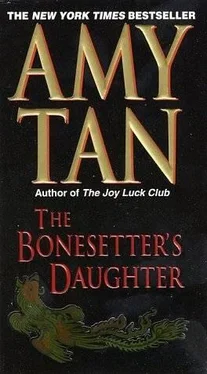"I suppose most people want to write their own book," she answered. "But I think I'm better at translating what others want to say."
"And you enjoy that? It's satisfying?"
"Yes. Absolutely. There's still a lot of freedom to do what I want."
"You're lucky."
"I am," she conceded. "I certainly am."
It pleased her to discuss such matters with him. With Wendy she tended to talk about peeves more than passions. They commiserated on rampant misogyny, bad manners, and depressed mothers, whereas Art and she talked to discover new things about themselves and each other. He wanted to know what inspired her, what the difference was between her hopes and her goals, her beliefs and her motivations.
"Difference?" she asked.
"Some things you do for yourself," he answered. "Some things you do for others. Maybe they're the same."
Through such conversations, she realized for instance that she was lucky to be a freelance editor, a book doctor. The discoveries were refreshing.
One evening, about three weeks after she met him, their conversation became more personal. "Frankly, I like living alone," she heard herself saying. She had convinced herself this was true.
"And what if you met the ideal partner?"
"He can stay ideal in his place, and I'll stay ideal in mine. Then we won't get into all that shit about whose pubic hair is clogging up the drain."
Art chuckled. "God! Did you actually live with someone who complained about that?
Ruth forced a laugh, staring into her coffee cup. She was the one who had complained. "We were opposites about cleanliness," she answered. "Thank God we didn't marry." As she said this, she sensed the words were at last true and not a cover-up for pain.
"So you were going to marry."
She had never been able to confide fully to anyone, not even Wendy, about what had happened with her and Paul Shinn. She had told Wendy of the many ways Paul irked her, that she was tempted to break up with him. When she announced to Wendy that they had split up, Wendy exclaimed, "Finally you did it. Good for you." With Art, the past seemed easier to talk about, because he had not been part of it. He was her yoga buddy, on the periphery of her life. He did not know what her earlier hopes and fears had been. With him, she could dissect the past with emotional detachment and frank intelligence.
"We thought about marriage," she said. "How can you not when you live together for four years? But you know what? Over time, passion wanes, differences don't. One day he told me he'd put in for a transfer to New York and it had come through." Ruth recalled to herself how surprised she had been, and how she complained to Paul about his not telling her sooner. "Of course, I can work almost anywhere," she had told him, annoyed yet excited at the prospect of moving to Manhattan, "but it's a jolt to uproot, not to mention leave my mother behind, and relocate in a city where I don't have any contacts. Why'd you tell me at the last minute?" She had meant that rhetorically. Then came Paul's awkward silence.
"I didn't ask to go, he didn't ask me to come," she told Art simply. She avoided eye contact. "It was a civil way to break up. We both agreed it was time to move on, only separately. He was decent enough to try to put the blame on himself. Said he was immature, whereas I was more responsible." She gave Art a goofy grin, as if this were the most ironic thing anyone could have said about her. "The worst part was, he was so nice about it-like he was embarrassed to have to do this to me. And naturally, I spent the last year trying to analyze what it was about us, about me, that didn't work. I went over just about every argument that we'd had. I had said he was careless, he said I made simple problems have difficult solutions. I said he never planned, he said I obsessed to the point of killing all spontaneity. I thought he was selfish, he said I worried over him to the point of suffocation, then pitied myself when he didn't fall all over himself saying thank you. And maybe we were both right and that was why we were wrong for each other."
Art touched her hand. "Well, I think he lost a terrific woman."
She was flooded with self-consciousness and gratitude.
"You are. You're terrific. You're honest and funny. Smart, interested."
"Don't forget responsible."
"What's wrong with being responsible? I wish more people were. And you know what else? You're willing to be vulnerable. I think that's endearing."
"Aw, shucks."
"Seriously."
"Well, that's sweet of you to say. I'll buy you coffee next time." She laughed and put her hand over his. "How about you? Tell me about your love life and all your past disasters. Who's your current partner?"
"I don't have one right now. Half the time I live alone, the other half I'm picking up toys and making jelly sandwiches for my two daughters."
This was a surprise. "You adopted them?"
He looked puzzled. "They're mine. And my ex-wife's, of course."
Ex-wife? That made three gay men she knew who had once been married. "So how long were you married before you came out?"
"Came out?" He made a screwy face. "Wait a minute. Do you think I'm gay?"
In an instant, she knew her mistake. "Of course not!" she scrambled to say. "I meant when you came out from New York."
He was laughing convulsively. "This whole time you thought I was gay?"
Ruth flushed. What had she said! "It was the ring," she admitted, and pointed to his gold band. "Most of the gay couples I know wear rings on that hand."
He slipped off the ring and rotated it in the light. "My best friend made it for my wedding," Art said solemnly. "Ernesto, a rare spirit. He was a poet and a goldsmith by avocation, made his living as a limo driver. See these indentations? He told me they were to remind me that there are a lot of bumps in life and that I should remember what lies between them. Love, friendship, hope. I stopped wearing it when Miriam and I split up. Then Ernesto died, brain cancer. I decided to wear the ring to remind me of him, what he said. He was a good friend-but not a lover."
He slid the ring over to Ruth so she could see the details. She picked it up. It was heavier than she had thought. She held it to her eye and looked through its center at Art. He was so gentle. He was not judgmental. She felt a squeezing in her heart that both hurt her and made her want to giggle and shout. How could she not love him?
As she gathered up Art's clothes at the dry cleaner's, Ruth flexed her big toe and remembered she was supposed to call Wendy. Mrs. Scott and a boy toy, what a shock. She decided to wait until she was in the parking lot by the grocery store, rather than risk a head-on collision during a juicy cell-phone conversation.
She and Wendy were the same age. They had known each other since the sixth grade, but had gone through periods when they did not see each other for years. Their friendship had grown via accidental reunions and persistence on Wendy's part. While Wendy was not the person Ruth would have chosen for her closest friend, Ruth was glad it had turned out to be so. She needed Wendy's boisterousness as balance to her own caution, Wendy's bluntness as antidote to her reserve. "Stop being such a worrywort," Wendy often ordered. Or "You don't always have to act so fucking polite," she might say. "You're making me look like shit."
Wendy answered on the first ring. "Can you believe it?" she said, as though she had not stopped repeating this since their last conversation. "And I thought she was over the top when she had the facelift. Last night she told me that she and Patrick were getting it on twice a night. She's telling me this- me, the daughter she once sent to confession for asking how babies were made."
Читать дальше












